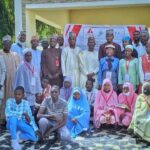The United Nations Humanitarian Coordinator in Nigeria, Mr. Edward Kallon, has said at least 30,000 internal displaced persons (IDPs) have been forced out of their homes on the shore of Lake Chad.
Mr. Kallon stated this after visiting Monguno and the Teachers Village camp for the IDPs on Wednesday.
He expressed grave concern following an upsurge in violence in the nation’s north-east.
An attempted attack on Monguno by Boko Haram insurgents on December 28, 2018 has exacerbated the situation, generating further displacement amid the uncertainty caused by the clashes.
“The impact of the recent fighting on innocent civilians is devastating and has created a humanitarian tragedy,” said Mr. Kallon
“It is heart-wrenching to see so many of these people living in congested camps, or sleeping outside with no shelter. Civilians continue to bear the brunt of the conflict and the United Nations is extremely concerned about the impact that violence in north-east Nigeria, especially in Borno state, is having on civilians.”
“More than 30,000 internally displaced people have arrived in Maiduguri, mainly from Baga, in recent weeks. The majority of these people have arrived since 20 December 2018, often after arduous journeys with young children.
“This includes an estimated 20,000 internally displaced people who have arrived in Teachers Village camp in Maiduguri, stretching the camp’s capacity beyond the limit.
“It is still unclear how many people are taking refuge in Monguno, but tens of thousands of people are in need of humanitarian assistance, notably shelter, food, water and sanitation,” said Kallon.
The UN chief said some 260 aid workers have been withdrawn from three local government areas (Monguno, Kala/Balge and Kukawa) affected by the conflict since November, affecting the delivery of humanitarian assistance to hundreds of thousands of people.
“This is the largest withdrawal of aid workers since the international humanitarian response which scaled up in 2016.
“While aid workers have started to return to some areas to respond to the urgent, life-saving needs, the lack of a secure operating environment is preventing a return to normal humanitarian activities,” he noted.
Clashes on 26 December 2018 between Nigerian government forces and non-state armed groups in Baga town, on the shores of Lake Chad about 200 kilometres north of state capital, Maiduguri, triggered the massive displacement, with most women, men and children converging on already congested camps or sites for internally displaced people in Maiduguri or Monguno town.

 Join Daily Trust WhatsApp Community For Quick Access To News and Happenings Around You.
Join Daily Trust WhatsApp Community For Quick Access To News and Happenings Around You.


